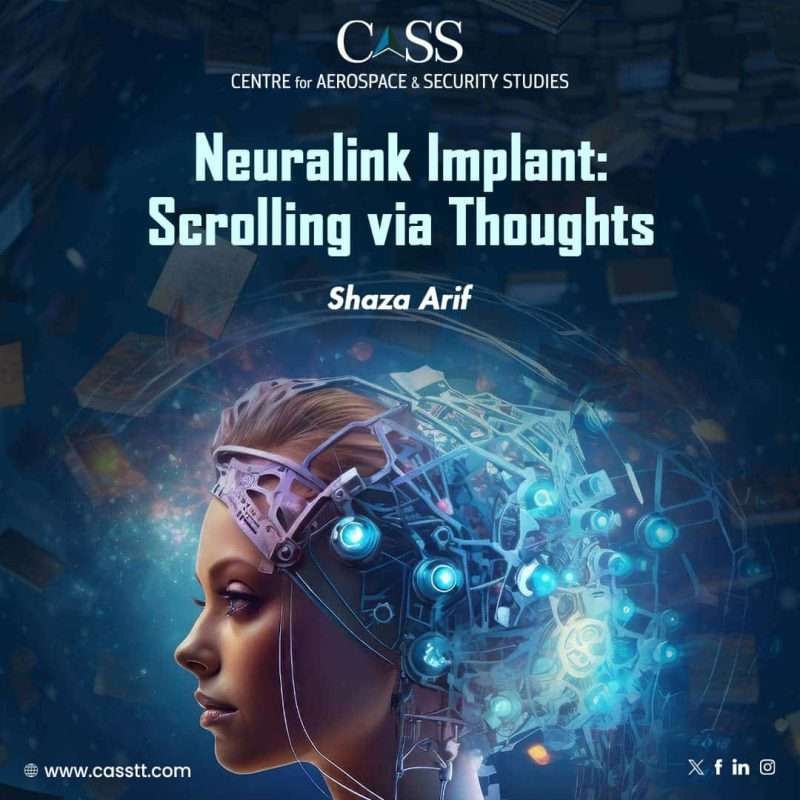The human thinking process is nothing short of a miracle. Our brain houses billions of neurons. Physical and mental activities are conditional upon the generation of electrical impulses which are passed on from one neuron to another. Technological advancements have led to the development of devices with the ability to detect impulses generated in the brain and develop an interface with smart devices. This exciting technological phenomenon is known as the ‘Brain-Computer Interface’ (BCI) – an old technology that has attracted renewed attention, given the ongoing efforts of several startups. A recent prominent initiative in this regard is implants by Neuralink. Following approval by the US Food and Drug Administration (FDA) last year, the startup founded by tech billionaire Elon Musk has made headlines with its first human implant in January. It has been reported that the individual succeeded in controlling a computer mouse using his thoughts.
The Neuralink implant underpins developing a BCI via installing a small coin-sized wireless device in the skull. By registering human brain activity, the device is used to transmit the information to a computer/smartphone device via Bluetooth connection for the desirable action. Musk has also revealed his plans to commercialise the technology with the initial project tagged as ‘Telepathy’ to control smart devices solely by thinking.
It has been disclosed that placing the device in the part of the brain that controls motor functions would help people with neurological disorders such as paralysis and epilepsy. Although different startups have already been working on similar projects such as Synchron, which has already implanted its device in ten patients. Expectations, however, seem slightly higher for Neuralink since it uses more than 1000 electrodes (with rival companies using 16), and its ability to target individual neurons which are anticipated to yield better results.
Interestingly, while most initiatives working on BCI aim to improve/impact the health sector, the broader goal of Neuralink is to augment human intelligence. Moreover, given its association with Elon Musk and his usual style of announcing major projects on X, the experiment has also garnered much more attention than other similar initiatives.
Musk has also claimed that symbiosis of the human brain and computers will help avert a potential AI apocalypseby ensuring that human cognitive capabilities are at par with emerging technologies. It has also been claimed that one day, this technology will have the potential to control our memories, implying that Neuralink may allow the potential downloading and saving of memories. In fact, Musk has revealed his own plans of getting a brain implant in the future.
The increasing advancement of BCI can lead to an era unleashing new forms of interaction and communication between humans and smart devices. While the venture looks inspiring, the convenience that technologies such as Neuralink offer certainly comes at a price. Although Musk tweeted that the patient who underwent the implant had shown recovery, adequate details are largely missing to verify these claims, raising concerns regarding safety practices. Additionally, the US FDA inspectors have also flagged concerns about quality controls and unsatisfactory record keeping of the animal experiments at Neuralink’s facilities on calibrations. It is pertinent to mention that previous incidents have been reported where monkeys were subjected to severe brain damage and tortuous death.
Beyond medical risks, tinkering with nature is also accompanied by significant ethical and privacy considerations – tampering or having direct access to brain activity brings back images of many a Hollywood movie – Inception, Total Recall, Minority Report, Lucy and of course The Matrix. Advancements in such technology also have the potential to create a monopoly of tech giants, accessing our intimate thoughts and even influence them at a later stage.
Risks also include psychological issues. Such developments can fuel digital amnesia, where the tendency of forgetting information is becoming increasingly prevalent owing to over reliance on technology. Moreover, as suggested, if endeavours like Neuralink can alter memory, it can directly impact how humans relate to their past. Hence, this tech is likely to aggravate problems that raise serious concerns regarding human identity. It could alter our understanding of our own self and the world, blurring the notion of reality and technology-fueled perceptions.
Nevertheless, the race of different startups to make advancements in the BCI sector is in full swing with significant investment (Neuralink, e.g. received USD 363m in funds), suggesting growing interest in the market.
Neuralink and other similar initiatives push us to contemplate the question: What is it like to be human in an era where our thoughts can be interfaced with software? As we continue to witness the increasing penetration of technology in our lives, our interactions are both astounding and worrying at the same time. Seamless interface of the human brain with computers opens new avenues, yet they are redefining the role of technology in our daily lives making human-integration technology increasingly complex. As the convergence of human beings with technology continues at a rapid pace, we must ensure that the journey continues to create meaningful experiences without compromising the core values of human identity and history.
Shaza Arif is a Research Associate at the Centre for Aerospace & Security Studies (CASS), Islamabad. The article was first published in Stratheia. She can be reached at cass.thinkers@casstt.com.




